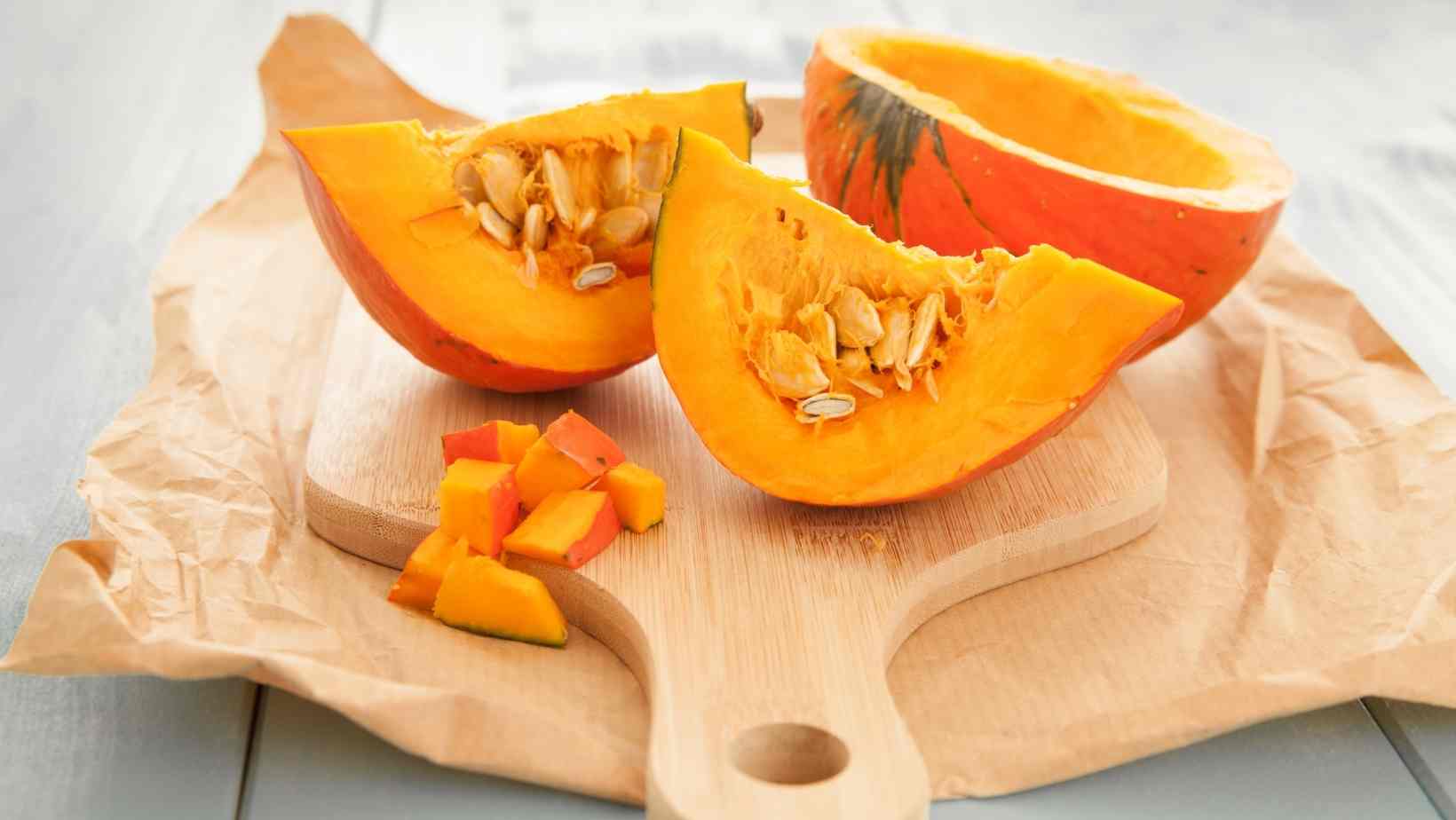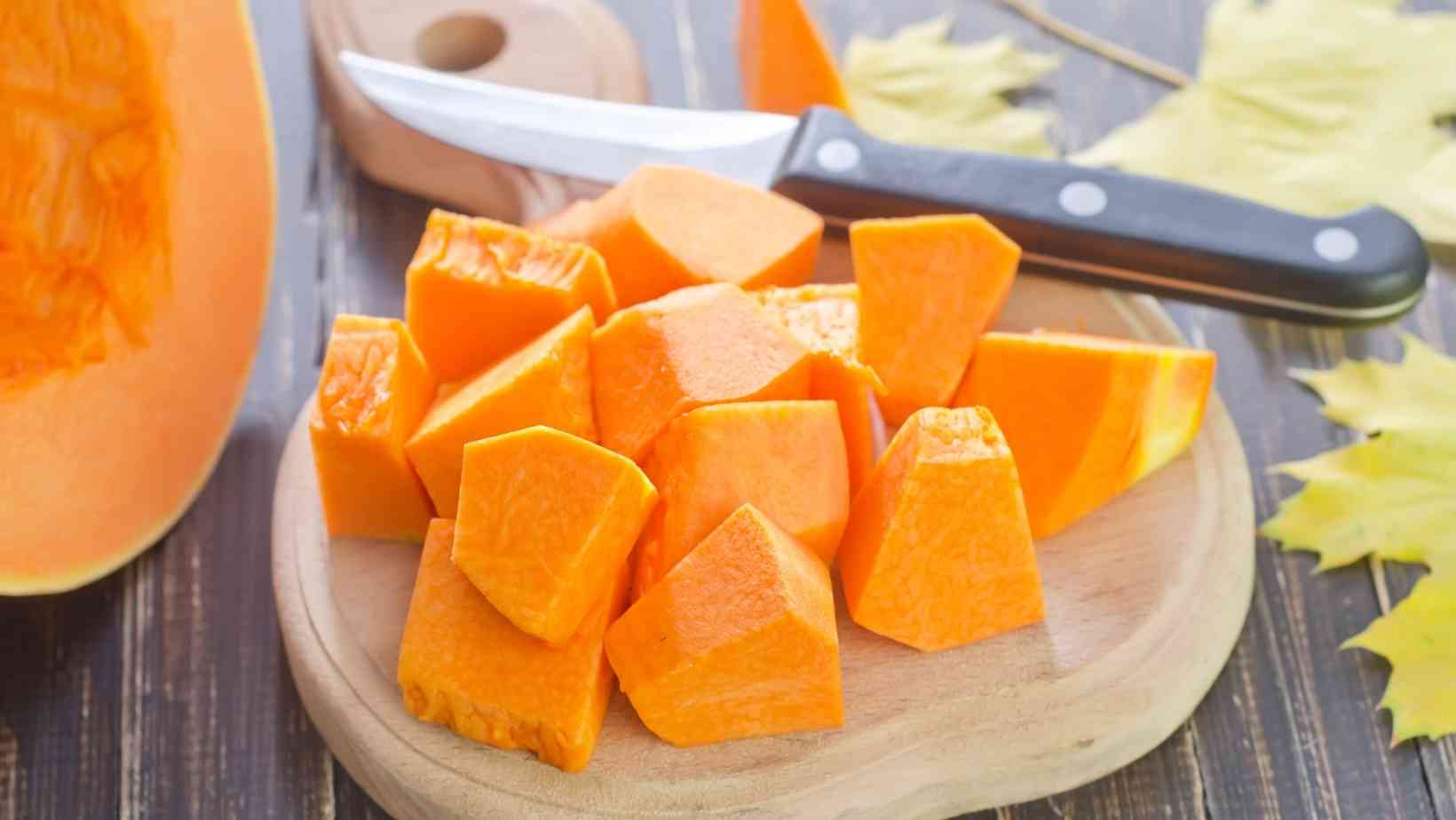Pumpkins are members of the Cucurbitaceae (squash) family and are big, spherical, and bright orange in colour, with a slightly ribbed, tough, but smooth outer skin. They are also known as gourds. The seeds and flesh of the pumpkin may be found within. When cooked, the whole pumpkin – skin, flesh, and seeds – are edible; you only need to remove the stringy pieces that keep the seeds in place while the pumpkin is cooking.

Pumpkins have a high nutritional value
An 80g serving of boiling pumpkin offers the following nutrients:
- 10Kcal / 42 KJ
- 0.5g Protein
- 0.2g Fat
- 1.5g Carbohydrate
- 1.4g Sugars
- 1.2g Fibre
- 67 mg Potassium
- 764mcg Carotenes
- 6mg Vitamin C
Pumpkin is one of your five-a-day vegetables, and an 80g serving (about three heaping tablespoons, diced and cooked) qualifies as one of your five-a-day vegetables.
Health Benefits Of Pumpkin
Jump to:
- Pumpkins have a high nutritional value
- 1. It has the potential to promote healthy skin
- 2. It may be beneficial to eye health
- 3. It has the potential to help the immune system
- 4. May be beneficial in lowering the chance of developing metabolic syndrome
- 5. It has the potential to help prevent cancer
- Is pumpkin a safe food for everyone to eat?
1. It has the potential to promote healthy skin
Several skin-friendly elements, including vitamins C and E, as well as beta-carotene, are abundant in pumpkins, and all of these nutrients are crucial in maintaining the health of our skin.
Because vitamin C is not produced by the body, it is essential that we get it from our food. Vitamin C is involved in the synthesis of collagen, which helps to maintain skin lush and tight. It also helps to prevent bruising and promotes wound healing, among other things.
When combined with vitamin C, vitamin E is a strong antioxidant that helps to protect against UV damage and dryness. Additionally, Vitamin A, commonly known as beta-carotene, is involved in skin protection from the sun's UVB rays and may help protect against sunburn, however sunscreen should still be used!
2. It may be beneficial to eye health
Low vitamin A levels have been related to impaired eyesight, and in certain cases, blindness in some people. In addition to vitamin C and E, beta-carotene helps to protect the eyes and minimise the chance of developing age-related eye problems. Pumpkin is also a good source of two carotenoids known as lutein and zeaxanthin, which have been associated with a lower risk of cataracts in those who consume large amounts of them.
3. It has the potential to help the immune system
Pumpkins contain beta-carotene, which when ingested is converted to vitamin A. This is shown by their vivid orange colour, which indicates that they are high in vitamin A. A growing body of evidence indicates that vitamin A is critical in the development and maintenance of healthy immune function. Vitamin C also adds to immune function by enhancing immune cell activation and raising the number of white blood cells in the body.
4. May be beneficial in lowering the chance of developing metabolic syndrome
Medical professionals refer to this disease as metabolic syndrome, which encompasses a number of disorders such as type 2 diabetes, obesity, and high blood pressure. Each of these problems, taken together, raises your chance of developing coronary heart disease and stroke.
Based on findings from Japanese research published in 2015, it seems that consuming a diet rich in carotenoids, which are pigments present in fruits and vegetables that give them their bright hues of orange, yellow, and green, may help reduce the development of the metabolic syndrome.
5. It has the potential to help prevent cancer
However, although there are no specific "superfoods" that will prevent cancer and many risk factors for cancer are unrelated to diet, there is evidence that following a balanced diet helps lower the chance of developing cancer. In addition, the antioxidant qualities of carotenoids, vitamins A and E, all of which are present in pumpkin, may help to protect against some diseases, such as breast cancer, according to some research.

Is pumpkin a safe food for everyone to eat?
Although pumpkin is generally considered to be safe for most people, some people may develop an allergy to it. This may be due to cross-reactivity with other fruits from the same Cucurbitaceae family, which is a fruit family that includes squash.
Diuretic action is suspected in pumpkin seed chemicals, and taking a significant quantity in a single sitting may result in an increase in the amount of fluid and electrolytes excreted via the urine. When taking some prescription drugs, such as lithium, you should consult your doctor or other healthcare expert for more guidance.




